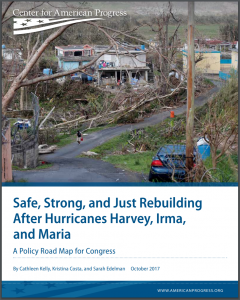Full Title: Safe, Strong, and Just Rebuilding After Hurricanes Harvey, Irma, and Maria
Author(s): Cathleen Kelly, Kristina Costa, and Sarah Edelman
Publisher(s): Center for American Progress
Publication Date: October 1, 2017
Full Text: Download Resource
Description (excerpt):
When it comes to rebuilding after this season’s hurricanes, Congress can and must do better. This report lays out four priorities for the congressional response to hurricanes Harvey, Irma, and Maria:
- Build back better. Congressional disaster aid packages should support programs at the U.S. Department of Housing and Urban Development (HUD), the Federal Emergency Management Agency (FEMA), and other federal agencies that enable communities to plan for the future, rebuild infrastructure to higher standards, and support innovative solutions that can better withstand extreme weather and other risks.
- Update flood risk data—and use it. In too many cases, FEMA flood maps are out of date or otherwise inaccurate, and none of them currently take into account the anticipated impacts of climate change. Congress should support updating flood maps for areas affected by this season’s hurricanes and other high-risk communities and ensure that federally supported infrastructure is built to withstand more frequent and severe floods.
- Prioritize communities that have the fewest resources to rebuild. Extreme weather events hit hardest in areas struggling to make ends meet and in black and Latino communities and other communities of color already overburdened by polluted air and water. Congress should ensure that any disaster aid package prioritizes support for families who need it the most—including in Puerto Rico and the U.S. Virgin Islands—and creates rather than hinders access to economic opportunity.
- Plan ahead to lower the risks and costs of the next disaster. It is not a matter of if extreme weather will strike the United States but when—including in the same communities struggling to respond to this year’s hurricane season. Congress has a fiscal and moral responsibility to support innovative and equitable strategies to build long-term resilience nationwide, such as establishing a so-called disaster deductible to encourage states, counties, and cities to take steps to protect their residents before disaster strikes.
